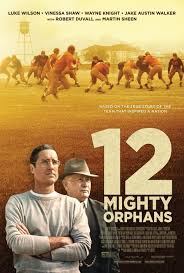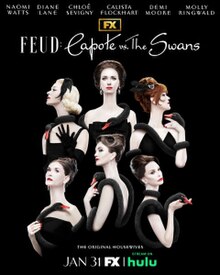Displaying items by tag: Treat Williams
12 Mighty Orphans

12 MIGHTY ORPHANS
US, 2021, 118 minutes, Colour.
Luke Wilson, Martin Sheen, Wayne Knight, Vanessa Shaw, Jake Austin Walker, Scott haze, Jacob Lofland, Robert Duvall, treat Williams, Larry Pyne.
Directed by Ty Roberts.
This is a film very much in the traditional American spirit, of country and patriotism, love of sport, especially football, appreciation of the underdogs.
It is based on a true story – however, quite a number of the facts and timelines have been altered for the drama.
In the aftermath of World War I (with a number of flashbacks of war action for the central character, Rusty Russell wounded, especially in his eyes but recovering), the film focuses on the Depression and its effect during the 1930s. In particular, it focuses on institutions for orphans, often looked down on in American society as second-class citizens.
Rusty Russell, already a top football coach, takes on the job at the Masonic institution for orphans in Fort Worth, Texas, travelling with his wife and family, his wife a successful English literature teacher. They are played by Luke Wilson and Vinessa Shaw.
The film shows the harsh life of the Institute, especially with one of the staff played by Wayne Knight, in charge of the printing business, exploiting the orphans, physical brutality towards them, and later revealed as embezzling money and colluding with the coach of an opposing team, a vengeful attitude towards Russell.
However, the focus of the film is on the orphans themselves, age 17, rough and ready, one with a particular chip on his shoulder and anger, gradually the group moulding into a team, getting gear from charities, working together with the coach who is inventive in his creation of play, becoming successful, opposed by powers that be with petty regulations and interpretation, the media intervening as well as to and ultimate success. However, with a sober realism, they lose the final championship match.
A number of veteran actors in supporting roles including Martin Sheen, at age 80, as the doctor assistant coach, a glimpse of Robert Duvall at age 90, and Treat Williams and Larry Pine as Roosevelt.
There is a fine tribute to the Russell’s as well as to each of the mighty orphans in the final credits, photos and an admirable list of achievements by each of them.
- Based on a true story? The alteration of facts and timelines? A tribute to Rusty Russell? His wife? Their work with the orphans, football and tactics, love of literature? The final tribute with the details of what happened to Russell and his wife, the 12 orphans themselves, achievement?
- A film of the American spirit, American football, sport, fans, even President Roosevelt, the Depression, the 1930s, poverty, lack of opportunity, the low status of orphans?
- The use of black-and-white photography, for World War I sequences, for the depression, the insertions? The atmosphere of the 1930s, Texas, the family travelling by car, the depressed communities, going to Fort Worth, the Masonic institution? The task of coaching the orphans? Of teaching them? The musical score?
- Russell and his story, the flashbacks to his experience in the trenches, the death of his brother, his blinding, his recovery? The recurring memories? His using his experiences to encourage the orphans? Married to Juanita, giving up a significant post, wanting to help the orphans? His daughters? His appearance and manner, glasses, difficulties with his eyesight? His explanation of his own background as an orphan?
- The Institute, the head, his concern about maintaining the workings, Frank Wynn, the printing, his bullying, hitting the students, his sneering attitudes, the rules, embezzling the money, his link with the rival coach, providing the birth certificate, his mistake, the confrontation with Russell, the hearings, his arrest?
- The orphans, their age, status, back stories, the mother abandoning Wheatie, Hardy, the death of his father, covered in blood, his resentments and anger? The lack of education? Interactions amongst themselves?
- The football theme: the opening, dressing room, the clashes amongst themselves? The rest of the story going back to arrive at this match?
- The boys themselves, their personalities, interactions? Hardy and his resentments, blood, shower, Snoggs trying to help? Continued manifestations of anger? The football field, rough, no shoes? The gradual building up of gear, shoes, pads, jerseys? Football issues? Scenes of training, boys’ reactions? Angers amongst themselves?
- The range of football matches, football scenes, the tactics, Russell’s daughter and her idea, the creative play, Russell changing play styles? The tough matches, the opponents, the referees?
- Doc Hall, age, no salary, his drinking, seeing the boys, a father figure, treating Hardy? Supporting Russell, recommending him? Assistant at the training, intervening in the crises, confronting authorities? At the games? His having to give up the drink?
- Juanita, supportive of her husband? The rough housing, settling in, her classes, enthusiasm, the boys and their learning?
- The rivalries, the hearings, Roy Kidd and the writing of the manual, his wanting to exclude the Mites, Doc Hall and the text? The hearings for their expulsion, his brother-in-law as the smug coach? The intervention of Amon Carter, his newspapers, watching the matches, his bets, links with the journalist, the reporting? The intervention of Roosevelt and the reversal of the decision?
- The hostile coach, setting up the big player to eliminate rivals? The hospitalisation of Fairbanks? Hardy, playing, his success, tactics? Eventually supporting the war cry?
- The failure to win, Hardy blaming himself, yet public support, fans, letters, demonstrations?
- The spirit of the Mites, the coach, love for football?
- The impressive tribute to the end and the careers of Russell and his wife and the orphans themselves, achievements?
Feud: Capote vs The Swans

FEUD: CAPOTE VS THE SWANS
US, 2024, 8 x 60 minutes, Colour.
Tom Hollander, Naomi Watts, Diane Lane, Chloe Sevigny, Calista Flockhart, Demi Moore, Molly Ringwald, Treat Williams, Joe Mantello, Russell Tovey, Jessica Lange, Chris Chalk.
Directed by Gus van Sant, Jennifer Lynch, Max Winkler.
As the second in the television series of Feud, created by Ryan Murphy (also creator of American Horror Stories and Glee). The first feud was between Bette Davis and Joan Crawford during the filming of Whatever Happened to Baby Jane.
Response to this series will depend on audience sympathy or not with its central character, author Truman Capote (previously played by Philip Seymour Hoffman in his Oscar-winning role in Capote as well as by British actor Toby Jones in Infamous). Capote, from the south, found fame with Breakfast at Tiffany’s and then his research for and publication of In Cold Blood. However, effeminate in style, camp, openly gay, he found acceptance in affluent New York society, especially with a group of women in the 1960s whom he dubbed The Swans. However, he wrote fictitious articles about them, but their being quickly recognised, they turned on him.
Response to the series will also depend on audience attitudes towards the Swans, the self-centred way of life, their arrogance, social ambitions – and the vengeance on capacity.
The series has a very strong group of directors as well as acting cast. Tom Hollander is completely convincing as Truman Capote – and a bonus is the presence of Jessica Lange in memories and dreams of his mother.
For some perspective on the characters and moral issues, the fifth episode is interesting in a created meeting between Capote and author James Baldwin, his encouraging Capote but their discussing and analysing his relationship with The Swans and his writing.
The central characters are all real but this is an interpretation of them – and, to the anger of some reviewers, it is a hostile/critical interpretation of Capote.
- The series on American Feuds?
- Audience knowledge of Truman Capote? American society in the 1950s to the 1970s? Interest/not?
- Truman Capote in himself, his life, his writings, success, reputation, vanity, gay orientation, love of society, the expose, vengeance wreaked on him, the impact of his mother, the meaning of his life?
- The impact of the series, eight episodes, the range of writers, directors? The prestigious cast?
- The episodes, moving around in time, flashbacks to Capote his childhood and relationship with his mother, as emerging in the 1950s, Breakfast at Tiffany’s, the 1960s, the research for writing In Cold Blood? His status? Yet his personal ambitions, the 1960s, society, friendships, his writing, the publication of the article, condemning the swans, reactions? His researching his reply, Answered Prayers? His drinking, drugs, health, relationships? Into the 1980s, his collapse, death?
- The significance of the fifth episode, the conversation with James Baldwin, his character and career and writing in the light of this conversation, James Baldwin and his reputation, literature, living abroad, homosexuality? Discussing the situation with The Swans? An opportunity for moral evaluation of the themes and characters?
- The attitude to New York society, wealthy, snobbery, status, moral perspectives, sexuality and relationships, betrayals, the impact of wealth, to be seen, restaurants, balls? Wealthy American New York society of the period? Households, mansions, lifestyle, fashion, beauty parlours and manicure is, servants…?
- The portrayal of The Swans? Babe Paley and her relationship with Bill, his fears, his impact on the world of television, her patience with him, yet her coldness towards her children and alienation? The 1950s and 60s, Capote entering into this world, Bill Paley’s reaction? The cells next? Babe and her devotion to Capote, his devotion to her? Slick, haughty, her marriages and flaunting her husbands, vindictive attitudes? Gossip, the Royal family, international status? C.Z., her lifestyle, gardens, horses, posing nude for Frida Kahlo, the painting, her friendship with Capote, Brinkley to him, mediating? Lee Radziwill, her relationship with her sister, Jackie Kennedy, her place in society, interactions with Capote? Not supporting him?
- Ann Woodward, her story, relationship with her husband, the shooting, her confronting Capote, the reaction of The Swans? His writing about her, her suicide? Her family coming later to haunt him?
- The episode of the Black and White ball, the discussions, the guest of honour, the irony of the editor of the Washington Post, The Swans vying with each other, the visuals of the ball?
- The Maysles Brothers? Their skills documentarians? The filming of the documentary on Capote in his life, in black and white, the presence of Albert Maysels’, devotion, dancing together? The effect of the film?
- The bonds between the women, ladies who lunch, Capote and his entree into their world, friendship with Paley, Paley turning against him? Capote exploiting his friendships?
- His writing, turning against the women, the visualising, the recognising themselves? The articles, widely read? The effect? The reaction of each of The Swans?
- Capote, the baths, the encounter with John, the relationship, John and his moodiness, leaving his family, some violence towards Capote it? The irony of his daughter, her coming to Capote, his taking her on, as a project, as a model, the incident of her being bottled on babe Paley, Richard Avedon in the photo at his change?
- Jack, the long relationship, his moving to Switzerland, his companions, trying to give advice to Capote?
- The background of his feud with Gore Vidal?
- Capote, the drinking, the intoxication of his connections, status in society, drugtaking, as range of partners and young men? Change of heart on not? The writing of Answered Prayers? Series dramatising the scenes from answered Prayers, the different light on The Swans?
- Babe, arrogant, yet sympathetic, her husband, illness, revealing it, her death? Her grave?
- The importance of his mother, her appearance in his fantasies, the reminiscence about the past, his bringing up, her influence, her being a prima donna?
- His later years, Johnny Carson’s former wife, care for Capote, his death?
- Audience response to the series, curiosity, prurience, revulsion, interest, judgement?